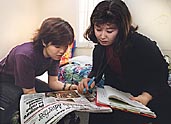 Sub captain chooses silence Sub captain chooses silence
 Periscope depth, timing may be key factors in inquiry Periscope depth, timing may be key factors in inquiry
 Court of inquiry's admirals bring broad range of expertise Court of inquiry's admirals bring broad range of expertise
 A Tribute to the Missing A Tribute to the Missing
 Previous stories Previous stories
 What do you think of the collision of the USS Greeneville and the Ehime Maru? Join our discussion board. What do you think of the collision of the USS Greeneville and the Ehime Maru? Join our discussion board.
By Glenn Scott
Advertiser Staff Writer
To prepare for the tense proceedings when the Navy opens its court of inquiry Thursday, Sue Zeng is reading newspapers and circling crucial words.
 |
| Translator Ayano Hara, right, helps Mio Toyoda, a reporter for the Japanese daily Yomiuri Shimbun, interpret a story in The Advertiser.
Deborah Booker • The Honolulu Advertiser |
Zeng, an instructor for the University of Hawai‘i’s Center for Interpretation and Translation Studies, said yesterday her office had been swamped with requests from news organizations looking for immediate help translating between English and Japanese.
She has dispatched six people who have worked for various agencies at different times during the past nine days. But precise interpretation, Zeng cautions, can’t always be accomplished as suddenly as events have dictated since a surfacing U.S. submarine collided Feb. 9 with the Japanese Ehime Maru, causing the fishing training ship to sink, and leaving nine of those on board missing and presumed dead.
"You can’t just pick up the phone and call a bilingual speaker," she said.
News reporters from Japan, Hawai‘i and the Mainland have been relying increasingly on interpreters as the fine details of the international drama become more critical. Americans, for instance, have needed interpreters to describe the comments and emotions of the distressed family members still waiting for news of their missing husbands, sons and brothers. Japanese reporters, who tend to speak some English, still want interpreters to confirm comments or translate written statements from the Navy and Coast Guard.
All this is increasing the demand for professional interpreters to work in subject areas where few have much training or expertise. "There are not many translators here in town," said Steve Silver, "with a good background in maritime disasters."
Silver, who operates his own agency, specializes in interpreting in court, where he said most of Honolulu’s top professionals work. And because those Japanese-English interpreters are almost always busy, they can’t shake loose to help with the Ehime Maru case.
"I had a call or two every day last week from someone new," he said. "I had to say, ‘Sorry, I wish I could.’ "
Other interpreters have accepted the challenge. The nonprofit Bilingual Access Line had about a third of its 15 Japanese-language interpreters out on the story last week, said program director Daryl Mukai. "We’ve had an increased demand," he said, "and a lot of it has been last-minute requests."
Another interpreter, Ayano Hara, has worked from dawn to nearly midnight for more than a week for the largest newspaper in Japan, the Yomiuri Shimbun. She said taking a job in a new area is part of the business. A recent job: interpreting for a company that makes items used in brain surgery.
"It’s not rare to study something new," Hara said yesterday. "But this case is very important. It’s not too different, but it has a lot of responsibility."
That’s why Zeng, who also trained Hara, has lately been conferring with interpreters Mihoko Munakata, Maki Eakin and other graduates of her program to identify hard-to-explain words before the court of inquiry, where she expects highly technical testimony to be delivered in English. They read the papers, circle the difficult words and try to find meanings.
"The court of inquiry is going to be a very tough job," she said. "For example, we need to know how to say all of the U.S. officer ranks in Japanese."
Even the title of the court has proved to be a problem, because it has no parallel in Japan. Yesterday, she said, four major Japanese newspapers each chose different terminology to refer to the court. And yet that may be a relatively easy translation compared with descriptions of submarine procedures such as the "emergency main ballast blow," the Navy’s term for the sudden method for surfacing that the USS Greeneville was using at the moment of collision.
Some Japanese terms are tricky, too. She said interpreters at first struggled with the English equivalent of "kuyashii," a term that some people from Japan have used to describe the way they feel about the ship’s sinking and aftermath. The interpreters finally agreed on "unforgivableness."
For Hara, the days have been long and the work exhausting. She said she has been "very careful" in her work and has not allowed her personal feelings to get involved, as dictated by her profession’s code of ethics. But her concern for the families of the missing people still motivates her.
"I feel like I want to do something for them," she said. "That’s like my gasoline. It keeps me going."
Glenn Scott can be reached by phone at 525-8064 or by e-mail, gscott@honoluluadvertiser.com.
[back to top] |

